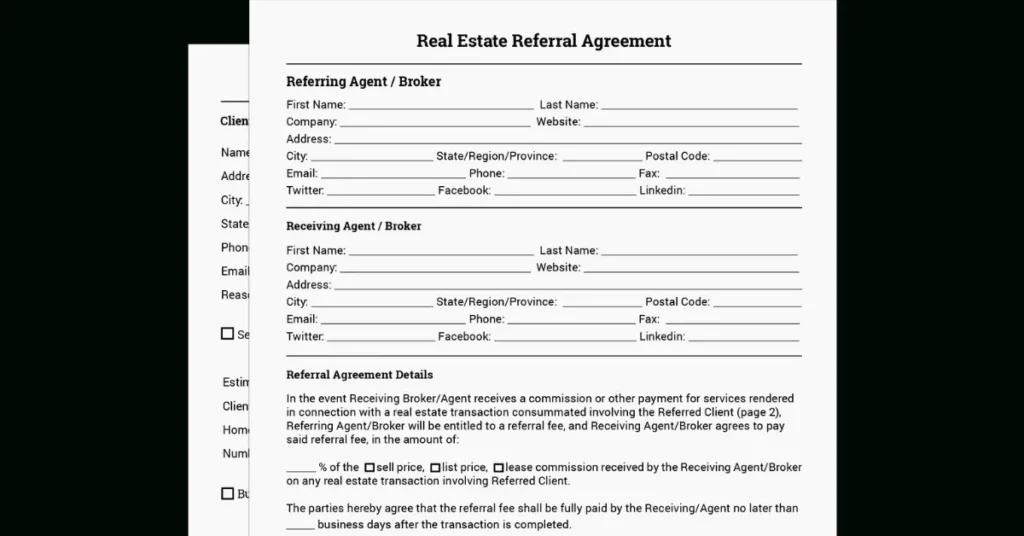Real estate referral fees involve paying agents who refer clients to other agents. Typically, agents earn a percentage of the commission from the referred transaction. These fees help agents grow their networks and earn extra income without handling the whole deal.
To set up a referral agreement, both agents must agree on the fee percentage and payment terms. They should put the agreement in writing to avoid misunderstandings. Agents must also follow state and federal regulations to stay compliant.
Managing referral fees well requires tracking referrals and payments accurately. Agents need to communicate clearly to maintain good relationships and ensure clients get great service. By following best practices, agents can enjoy a steady income from referrals and help clients find the right properties.
What is a real estate referral?
A real estate referral happens when one agent sends a client to another agent. The first agent earns a fee for making the referral. This system helps clients find the best agent for their needs.
Agents often refer clients if they work in different areas or specialize in different types of properties. By referring clients, agents ensure that clients get expert help. This builds trust and makes clients happy.
To make a referral, agents agree on a referral fee and put it in writing. This keeps things clear and fair. Referrals help agents grow their business and provide better service to clients.
The most common reasons for real estate referrals
- Real estate referrals happen for many reasons. Here are the most common ones:
- Agents work in different locations.
- Agents specialize in different types of properties.
- Agents have a full workload and can’t take on new clients.
- Clients need services outside an agent’s expertise.
- Agents want to provide the best service by connecting clients with a more suitable agent.
- Agents have strong networks and can recommend trusted colleagues.
- Clients are moving to a new area and need a local expert.
- Agents want to maintain a good reputation by ensuring clients get excellent service.
- Agents receive a referral fee, providing an extra income stream.
How can I ask for a real estate referral fee?

To ask for a real estate referral fee, start by having a friendly conversation with the other agent. Explain that you have a client to refer and would like to discuss a referral fee. Be clear and upfront about the fee percentage you expect.
Next, agree on the terms of the referral fee with the other agent. Make sure both of you understand the details, such as the fee amount and when it will be paid. It’s important to get everything in writing to avoid any misunderstandings later.
Finally, maintain open communication throughout the process. Follow up with the agent to ensure they received your referral and keep track of the transaction. This helps build trust and ensures you get your referral fee when the deal closes.
How much is a referral fee in real estate?
In real estate, a referral fee is usually 20% to 25% of the agent’s commission. This fee can vary based on the agreement between the agents. Some referral fees might be higher or lower depending on the situation.
Agents agree on the referral fee amount before making the referral. They put this agreement in writing to keep everything clear. Both agents need to understand and accept the fee terms.
The referral fee helps both agents. The referring agent earns extra income, while the receiving agent gains a new client. This system benefits everyone involved and helps clients find the best agent for their needs.
What is the difference between a finder’s fee and a referral fee?
A finder’s fee is paid to someone who finds a potential client for a business or service. This person might not be a licensed real estate agent. They simply connect the client with the business and get paid for it. It’s like spotting a great restaurant and telling your friend about it.
A referral fee is paid to a licensed real estate agent who refers a client to another agent. The referring agent typically earns a percentage of the commission when the transaction closes. It’s like passing a client’s contact details to a colleague who specializes in their needs, and both agents benefit from it.
Who pays the real estate referral fee?
In real estate transactions, the referring agent typically pays the referral fee. This fee is deducted from the commission earned by the referring agent when the transaction closes. It’s a common practice in the industry to compensate the agent who made the referral for their service and expertise in connecting the client with another agent.

Responsibilities of the Referring Agent
The referring agent has several key responsibilities:
- Making the Referral: Introducing the client to another agent who can better serve their needs.
- Negotiating the Fee: Agreeing on a referral fee percentage with the receiving agent.
- Documenting the Agreement: Putting the referral agreement in writing to ensure clarity and avoid disputes.
- Ensuring Compliance: Following state and federal regulations regarding referral fees.
The referring agent earns the referral fee once the transaction is successfully completed, typically deducted from the commission received.
Responsibilities of the Receiving Agent
Receiving agents in real estate referrals have several responsibilities:
- Acknowledging the Referral: Recognizing and acknowledging the referral from the referring agent.
- Providing Excellent Service: Ensuring the referred client receives excellent service and assistance.
- Paying the Referral Fee: Paying the agreed-upon referral fee to the referring agent upon successful completion of the transaction.
The receiving agent plays a crucial role in maintaining a positive relationship with the referring agent and ensuring the client’s needs are met effectively
How much do real estate referring agents earn?
Real estate referring agents typically earn a percentage of the commission from the transaction they referred. The exact amount can vary, but referral fees generally range from 25% to 35% of the commission earned by the receiving agent.
The amount earned depends on factors such as the total commission earned by the receiving agent, the local real estate market, and the specific agreement between the agents involved. Referring agents can earn significant income through referrals.
Why should I pay a real estate referral fee?
There are several reasons why paying a referral fee makes smart business sense, including:
Maintaining good professional relationships
Maintaining good professional relationships is important because:
- It helps build trust and respect among colleagues.
- It fosters a supportive and collaborative work environment.
- It increases opportunities for future referrals and business partnerships.
- It enhances your reputation in the industry.
- It ensures smooth and efficient transactions for clients.
Lowering the cost of acquiring business
Lowering the cost of acquiring business is crucial in real estate. By paying referral fees, you tap into a cost-effective way to acquire new clients. This strategy helps you focus resources on servicing clients rather than solely on acquiring them
Related Article: SAVE YOUR HOUSE FROM DEMOLITION IN 2024: A STEP-BY-STEP GUIDE
How do I structure a real estate referral agreement?
To structure a real estate referral agreement, start by agreeing on the referral fee percentage and payment terms with the other agent. Clearly outline each party’s responsibilities, such as how client information will be shared securely and how the referral process will be managed.

Next, ensure the agreement adheres to local real estate regulations to maintain legality and fairness. Having a well-structured referral agreement helps to prevent misunderstandings and fosters a productive working relationship between agents.
What should every real estate referral fee agreement include?
Here’s how to structure a real estate referral agreement:
- Agree on Referral Fee: Decide on the percentage of commission the referring agent will receive.
- Outline Responsibilities: Clearly define each agent’s role in the referral process.
- Specify Payment Terms: Detail how and when the referral fee will be paid.
- Secure Client Information: Ensure client privacy and security protocols are established.
- Comply with Regulations: Confirm the agreement meets legal requirements in your area.
Benefits of Referral Fees
These are the benefits for Real Estate agents and For Clients.
For Real Estate Agents
Referral fees offer several benefits for real estate agents:
Additional Income: Agents earn extra money from referral fees, boosting their overall income.
Expand Network: Referring clients to other agents helps expand your professional network.
Focus on Expertise: Allows agents to focus on their strengths and refer clients needing specialized services to other experts.
Client Satisfaction: Ensures clients receive the best service from agents with the right expertise.
Build Relationships: Helps build strong relationships with other agents, fostering future referrals and collaborations.
Referral fees not only provide financial rewards but also enhance professional growth and client satisfaction, making them a valuable strategy for real estate agents.
For Clients
Here are the benefits of referral fees for clients:
Access to Expertise: Clients are connected with agents who specialize in their specific needs.
Wider Network: Referral fees allow agents to refer clients to trusted professionals outside their immediate reach.
Enhanced Service: Clients receive personalized and attentive service tailored to their requirements.
Also Read This Article: COMPENSATION FOR DELAYED CLOSING IN REAL ESTATE TRANSACTIONS: CAUSES, OPTIONS, AND TIPS
Build a strong referral network with Luxury Presence
Building a strong referral network with Luxury Presence is essential for expanding your real estate business. Start by connecting with other agents who specialize in different areas or types of properties. This network allows you to refer clients confidently, knowing they’ll receive excellent service.
Leverage Luxury Presence’s tools and resources to streamline the referral process. Their platform helps you track referrals and stay in touch with clients and agents alike, ensuring a seamless experience for everyone involved.
By actively participating in Luxury Presence’s community, you can strengthen relationships with other real estate professionals. This collaboration not only enhances your network but also increases your referral opportunities, ultimately growing your business.
Frequently Asked Questions
What are real estate referral fees?
Real estate referral fees are payments made to agents who refer clients to other agents, typically a percentage of the commission earned from the transaction.
Who pays the real estate referral fee?
The referring agent typically pays the referral fee, which is deducted from the commission they earn when the transaction closes.
How much do real estate referring agents earn?
Referring agents typically earn between 25% to 35% of the commission earned by the receiving agent in the transaction they referred.
Why should I pay a real estate referral fee?
Paying a referral fee helps you expand your network, focus on your expertise, provide excellent service to clients, and maintain good relationships with other agents.
How do I structure a real estate referral agreement?
To structure a referral agreement, agree on the referral fee percentage, outline responsibilities, specify payment terms, and ensure compliance with local real estate laws.
Final Thoughts
Real estate referral fees are a valuable tool for agents to expand their networks by providing specialized services to clients. By structuring clear referral agreements, agents can ensure fair compensation to maintain strong professional relationships.
This guide has outlined the benefits of referral fees, how to set up a referral agreement. And why they are beneficial for both agents and clients. Embracing referral fees can enhance the efficiency of real estate transactions and contribute to a more collaborative industry overall.

Paul Mitchell, our website’s author, leverages 6 years of business expertise to provide insightful content. His wealth of experience enriches our platform, offering valuable insights for our readers.











